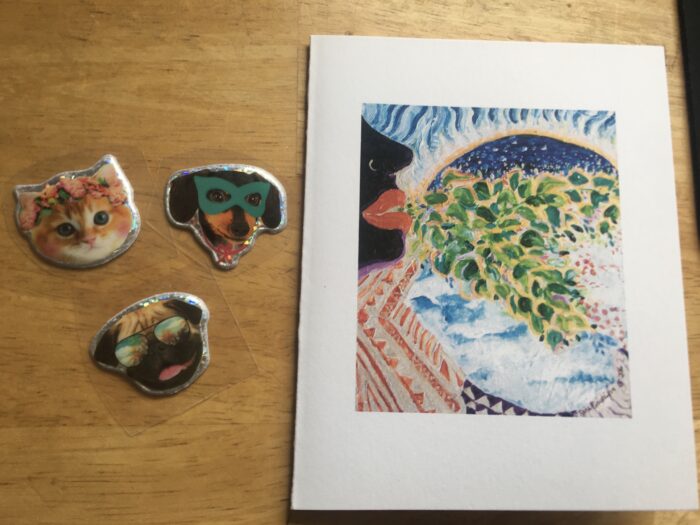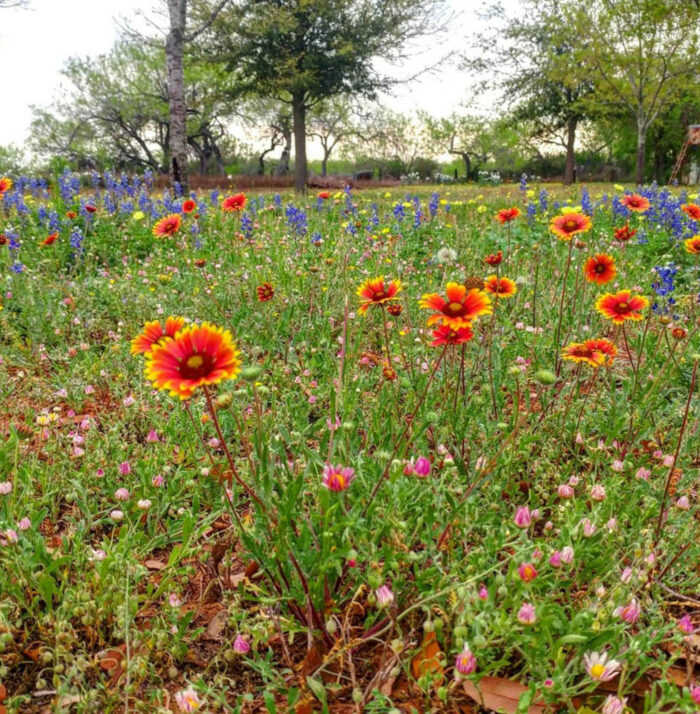Recently, on a fresh spring day– our neighborhood oak trees’ bark still damp and dark from needed rain– I was invited to Rice University’s campus to guest speak at Kelly McKisson’s freshman writing seminar, themed on climate. I got to stand in a beautiful room full of windows, experience minimum tech issues, and talk with students about Commission Shift and our work to reform the state’s oil and gas agency. It was a spring dream.
Kelly is one of those great educators who works to prepare her students for what they can do with their degrees, so I was grateful to get the chance to talk about my career in communications and impress on them the importance of English majors in the public policy and advocacy sectors. The world needs precise and creative communicators who understand narrative, writing mechanics, and concepts of rhetoric– as we often have to address many different audiences in order to connect ideas and bring people together.
I also got to learn from these students too! Out of a class of 15, do you know how many have heard about the Railroad Commission of Texas? I’ll give you a second to guess for yourself … Ready? The answer is three– and one was from working on a paper for this class. We have a lot of work to do to make sure that everyone living in Texas knows about the state’s oil and gas agency, one of the most crucial energy agencies in the country. But at least 15 people know more now than they did before.
I’d like to use the rest of this blog to answer some of the fantastic student questions (below) and I’ve invited some of my coworkers to weigh in too, in the hopes that others will find it informative.
Thanks, Kelly, for having the foresight to ask everyone to write these questions down. And thank you Kelly and FWIS 198 for inviting me to join you!
-SJ Stout
Communication is best when it’s specific, so I try to keep my messages closely tied to the work Commission Shift does to reform the state’s oil and gas agency. Many might understand the risks and impacts of climate change, but fewer people understand the huge role the state’s oil and gas agency plays in addressing (or failing to address) climate impacts. So we can connect the dots there – between more frequent extreme weather, grid failure, contaminated water, and the state oil and gas agency to name a few examples. I also focus my communication in a more targeted way by coordinating messages and stories with other advocates and members of the press to make sure that the people most impacted by oil and gas development, those who are experiencing blowing out and leaking wells, wasted land or dead cattle from briney contaminated water, are getting their story connected with the people in a position of power to do something, whether that’s the Railroad Commissioners, state legislators, or the EPA.
Unfortunately, the Texas Legislature seems to be the biggest obstacle standing between Texas’s current power grid and a clean power grid. Renewable power is getting cheaper and wider spread–Texas leads the country in wind power and is second only to California in solar. While we would expect that all our energy sources would compete equally on the power market, some Texas lawmakers want to pass legislation that favors oil and gas, and traps renewable power in more red tape and higher taxes. See senate bills 2015 and 7, and this recent story in the Houston Chronicle for more.
Our state still needs oil and gas in the immediate future, but one area that we *do* have the ability to reduce effectively and meaningfully is methane and other polluting emissions. Operators have the technology and the cost effective means to reduce these emissions, but the state oil and gas agency does not require operators to do so, or closely monitor current emissions themselves. In fact, the Railroad Commission regularly grants flaring exception requests to operators, and has promised to sue the EPA if they are asked to limit flaring. What’s more, flaring emissions are an environmental justice issue. One study found that Latina women living near emissions in the Eagle Ford Shale experience 50% higher odds of preterm birth. There’s no excuse to continue flaring and emitting at the rate we do.
The hot topic right now is CCUS technology and hydrogen. CCUS stands for carbon capture, use, and storage. Until recently, CCUS mostly meant that CO2 was being captured and injected in the ground in order to recover more oil and gas reserves that were previously inaccessible. This is a process known as “enhanced oil recovery” and undermines any climate goals, because it only prolongs the practice of burning fossil fuels. The other use, where new government subsidies are currently flowing, is the capture and permanent storage of CO2 in the ground. The problem with this technology is that injected CO2 creates an acid gas plume that can corrode metal, contaminate water, create earthquakes, and asphyxiate people and surrounding wildlife, should it blow. The Railroad Commission, the state oil and gas agency, is also applying to the EPA for full control of permitting and overseeing these CCUS projects. Based on their track record with current oil and gas and wastewater injection wells, we think CCUS is a public health hazard under their supervision. So, as CCUS comes to Texas, we are advocating for a thoughtful approach, impact studies to prevent already overburdened communities from bearing risks should something go wrong, and the EPA to keep oversight of the projects instead of the Railroad Commission.
Great question. Oil and gas operators are going to want to go where the oil and gas is, but different communities have varying degrees of success with keeping oil and gas pollution and infrastructure at bay. Livable Arlington is a great example of residents who have banded together to fight off pump jacks and other oil and gas drilling projects within throwing distance of their homes, business, and even a daycare center. They are still fighting for better air and water conditions in their community.
There are also unequal impacts from oil and gas pollution. People are more at risk of having worse health outcomes if they are medically uninsured, or can’t afford the time off to see a doctor or make public comments or meetings. The state oil and gas agency’s website is also only in English, is difficult to navigate to make a report, and has very little transparency about the reporting process and how operators in violation are held accountable. These are all huge barriers to the average person, and are especially difficult to low income, marginalized communities who are already disenfranchised.
I think companies like Exxon and Chevron are scrambling now because they have made promises to the public to go net zero, but have assured their stockholders they are going to increase drilling. Some journalists have called out the complete incompatibility of these two promises.
Where to begin! I mentioned emissions above, and there are plenty of concrete steps the Railroad Commission could take to reduce the state’s orphaned well inventory as well. You can read our full recommendations for orphaned wells, as well as watch the video version. We also have recommendations for cleaning up the ethics at the commission such as increasing public and language accessibility, changing the name of the agency to reflect what it actually does, and reducing conflicts of interest, or the appearance of conflicts of interest. (And here is the recent Texas Monthly story I mentioned in class that did a deep investigation to find the full extent of Christi Craddick’s income from oil and gas last year).For each of these recommendations we also (i) fight for them at the state legislature in the form of new laws, (ii) share them with the public in order to build support for reform, and (iii) help impacted individuals better navigate the system.
You will have to ask Greg Abbott and Dan Patrick about their attitude towards climate change issues, but I will say that they released their priorities for the legislature earlier this year, (Greg Abbott’s priorities and Dan Patrick’s priorities) so you can see where they will be putting their energy.A nonprofit organization can contribute to help marginalized communities in many ways. In Commission Shift’s case, we help impacted folks navigate state agencies, bring media attention to their problems to help build support, and also partner and plan with other impacted groups on aligning work and sharing resources, and occasionally sponsoring relevant travel or training for those who could not otherwise afford to.
Commission Shift is a statewide group based in Laredo, so a lot of our work has been in oil and gas heavy counties in West Texas, and at the state capitol. We will be increasing our attention in Houston, however, especially if we are able to grow our organizing team, and if we see more CCUS infrastructure here.
Probably a lot of things could go into this answer, but my sense of apathy or burnout comes from getting overwhelmed at the big picture instead of looking at the things I have control over. There’s a classic line about how to eat elephants – one bite at a time. I don’t know who is out there eating elephants, but the metaphor holds: when I find myself in the shadow of a problem too big, I try to take a break and then refocus on grounding myself and moving forward on the small things I can control, one thing at a time. Oh, and taking pleasure in the work and finding enjoyment in the process.
Use your skills, talents, and interests to plug into groups and communities around you that are making plans and already practicing for a cleaner, more energy efficient future. This can look like learning about environmental justice groups and their needs, using public transportation and advocating for free public transportation; supporting better grid resilience, more energy efficiency programs for retrofitting homes, or a city climate resiliency plan; participating in mutual aid or “buy nothing” groups; or learning more about healing and reclaiming the land.Don’t judge yourself for not doing it all (this is a system-problem not an individual failing) but let yourself get curious about all the conversations and opportunities out there to take action and spread the word. To get involved with Commission Shift, check out our “get involved page” and subscribe to our free monthly newsletter. Please also vote, learn about the candidates, and don’t skip the race for “Railroad Commissioner” on your ballot :).

Pictured: One beautiful card, and three perfect 3D puffy stickers from Kelly McKisson, climate educator.

Texas Oil and Gas Business Owners Can Run the Agency that Oversees their Businesses